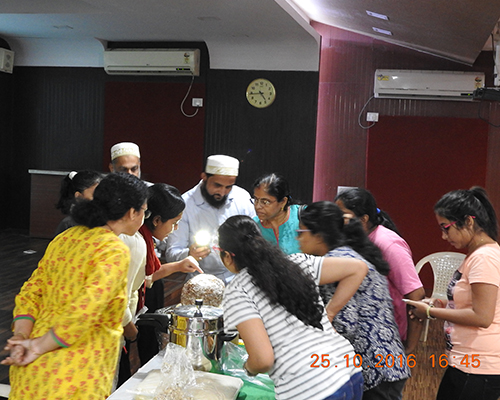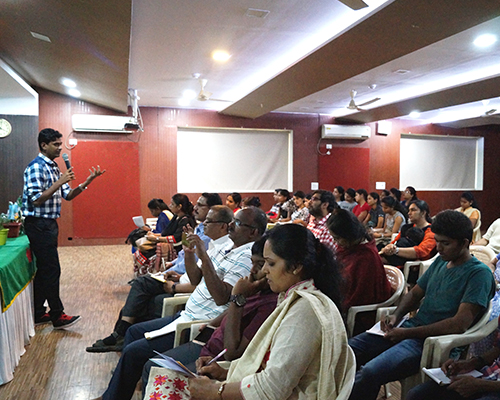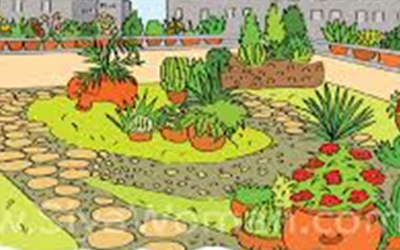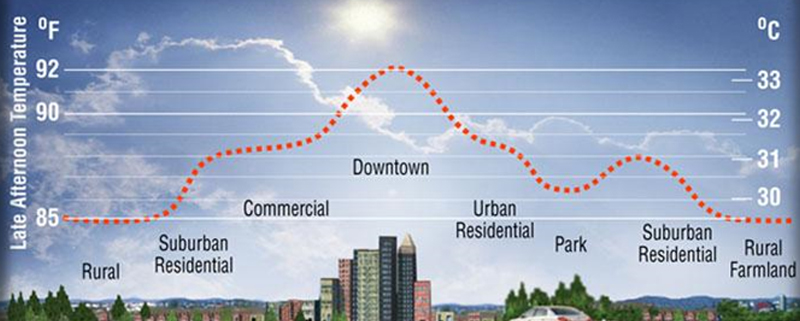Sustainable Communities
Bioprospecting
Sustainable Communities
- Livelihood Support and Nutritional Security through Food Processing and Fortification
- Nutritional Security and Livelihood Support through Off-farm Livelihood initiatives
- Nutritional Security through Nutri-Gardens and Food Fortification
- Developing Pathardi in Palghar District into a Sustainable Village
- Canteen for Teens - Focusing on "Know, Grow and, Cook your own food" for Urban Youth
- Urban Farming - A Sustainable Approach for Urban Nutrition
Urban Farming - A Sustainable Approach for Urban Nutrition Duration: 2012-OngoingPartners: Navi Mumbai Municipal Corporation (NMMC), Urban Development Department, GoMSponsors: Ugaoo.com, KRAFT
 Participants at a Mushroom Cultivation Demonstration Workshop
Participants at a Mushroom Cultivation Demonstration Workshop TERI, under the guidance of Urban Development Department, GoM, and in collaboration with NMMC took up the initiative to develop Navi Mumbai as an Eco-city, under which, TERI aimed to establish and promote urban farms in the city.
Under its Eco-city project TERI conducted workshops in Navi Mumbai promoting organic urban farming. The workshops were on topics such as the cultivation of Oyster mushrooms at home and demonstration workshops on ‘Growing organic vegetables in windows & balconies.
In general, Urban Farming would help achieve the following
Nutritional security-
One of the main objectives for promoting urban farming was to help establish nutritional security in urban areas. A person might be consuming the required amount of food, but might not be getting the nutrition required for his or her body due to the low nutritional content of the food being consumed. The food available in cities in most cases is mostly low in nutritional value due to reasons such as transportation over long distances, processing and storage for long durations, and so on. Bruises and damage to easily perishable fruits and vegetables further decreases causes losses.
 An Urban Farming Demonstration Workshop in Progress
An Urban Farming Demonstration Workshop in Progress Another grave problem is the usage of hazardous pesticides in commercial agriculture that leads to the accumulation of these toxic chemicals in our bodies, some of which have been proven to be carcinogenic in addition to causing a large number of disorders and ailments. Commercially cultivated fruits and vegetables have also been known to contain high amounts of heavy metals such as arsenic (known to cause developmental effects, cardiovascular disease, neurotoxicity, etc.), Cadmium (toxic to the kidney and deteriorates the bones), etc. Hence, it is safe to assume that consuming these pesticide laden fruits and vegetables that are transported over large distances may actually do us more harm than good.
Growing their own fruits and vegetables will provide citizens healthy, nutritious and a secure source of produce to meet part of their daily food requirement, free from harmful toxins. More importantly, the produce can be freshly harvested when needed and consumed, thus keeping its nutritional content intact. Thus, urban farming can help bring about nutritional security in urban families to some extent.
Biodegradable Solid waste generated in the city could be used for making compost and its use for cultivation of fruits and vegetables.

Disposal of solid wastes in cities is an ever growing problem with millions of tons of waste being generated every day in India’s cities. In the city of Navi Mumbai alone, 622.99 tons of waste is generated in the residential areas, a large quantity of which is bio-degradable. Bio-degradable waste can be easily treated and converted into compost also known as ‘black gold’ as it is extremely beneficial for plants and makes an extremely good fertilizer for organic cultivation. Composting using easy techniques can be practiced by the citizens; this will not only reduce the pressure of disposing huge amounts of Municipal solid waste (MSW) and reduce the amount of pollution caused by the same but also creates an extremely beneficial by product that can be used in one’s urban farm to cultivate fresh fruits and vegetables.
Improving the microclimate
The lack of Green cover in cities lea ds to a phenomenon called the Urban Heat Island effect where the mean temperature of an urban area is higher than other areas. Concretization, industries and pollution further aggravate the situation leading to a constantly increasing urban temperature. Urban farming helps combat this to a certain extent by helping control the rising temperatures in the microclimate of an urban area.
1 Figure 1: Urban Heat Island effect
GHG emissions.
The Mumbai Metropolitan Region has lost almost 300 sq. km of agricultural land in the last 20 years3. The city relies on places that are far away to meet its food requirement and transportation of food over large distances requires a large amount of energy. Most of the food we consume gets transported from places as far as 500 km away. This not only reduces the nutritional quality of the food but also generates a large amount of carbon emissions along with wastage of energy in the form of fuel used for transportation. The amount of CO2 released for transportation of one kind of vegetable into the MMR is 68,000 tons/year and amount of CO2 emitted for 20 vegetables is 1.36 million tons/year4 which is equivalent to the amount of CO2 emitted (at 0.12 kg/km)5 by an average diesel car making 8043530 trips between Mumbai and Delhi! Another grave problem is the usage of hazardous pesticides in commercial agriculture that leads to the accumulation of these toxic chemicals in our body, some of which have been proven to be carcinogenic in addition to causing a large number of disorders and ailments. These fruits and vegetables also contain heavy metals which are extremely harmful to human health.
- Per capita annual consumption of vegetables: 77 kg
- Total food consumption per year: 77 * 23133424 = 180 million kg
- Capacity of truck: 10,000 kg of vegetables
- Fuel required for a single 500 km journey of truck: 100 L
- Total number of trips: 1,80,000
- Total fuel requirement: 100 * 1,80,000 = 1,80,00,000 L
- Emission of CO2 per year = 68,000 Tonnes
The concept of urban farming aims to address these issues. It ensures nutritious food into the daily diets of citizens and provides them with various economic, social and health benefits.
